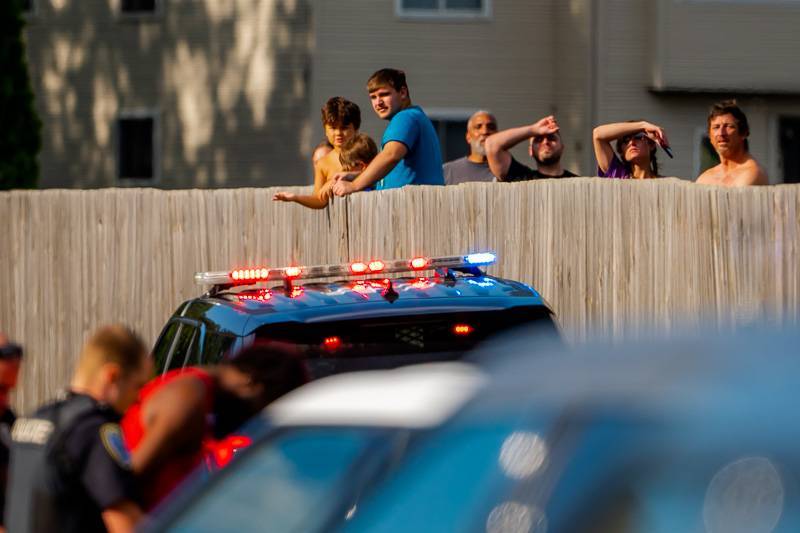City Council agrees to NET a solution for crime

Photo by Howard Owens.
Recent incidents of violence — four gun shootings in the last three months — have pushed city officials to put a quick thaw on a hiring freeze that was locked until March 2024.
Instead, City Manager Rachael Tabelski has suggested bringing one more police officer on board and providing training, vehicles, and additional equipment for the new and a current officer to become a more intense Neighborhood Enforcement Team (NET) to assist the city police department and detectives to “more efficiently, proactively keep the community safer.”
“Because I think it's critically important that we have our zone cars that are out on calls. They respond very quickly to people's homes, and they're very responsive. But we need a proactive team to be in the neighborhoods doing gun and drug interdiction, and I think it's very important,” Tabelski said Monday during City Council’s conference session at City Hall. “So we're gonna find a way to make it happen in the budget next year.”
During her presentation to City Council, Tabelski emphasized that when state changes to the legal system occurred — including what's coined as “catch and release” for a quick turnaround jail and bailout time — Chief Shawn Heubusch warned her that more manpower was going to be required.
“And in the beginning, the chief told me, ‘we're going to need more, we're going to need more, we're going to need more,’ and I said, there's no money, there's no money, there's no money. Now, we're at critical mass. We can't allow this to happen in our city,” she said. “I don't think anyone here on council wants that to occur. I certainly don't. So we're gonna find a way to make it work.”
Tabelski recommended using video lottery terminal money (typically a yearly amount that comes from Batavia Down Gaming revenues) in the amount of $272,000 to pay for the salaries and benefits for the two officers for eight months ($117,000), purchasing and fitting two police vehicles ($120,000) and for uniforms and equipment ($35,000).
Councilman Bob Bialkowski asked what if the city doesn’t get the VLT aid next year, and Tabelski said she isn’t planning to use that resource next year anyway. Sales tax has been doing very well, she said, and perhaps cannabis sales will be bringing in more sales tax and will be able to help offset the cost, she said.
“We need to find a way to make it happen next year,” she said.
As for the equipment, that would be a one-time expense, Council President Eugene Jankowski Jr. added.
“I know it will work. It worked in the past,” he said.
The method for attacking the problem of gun violence, repeat offenders and nuisance neighbors is a team approach, Police Chief Shawn Heubusch said. “It’s a one-off, it’s a very effective format,” he said. “You get to saturate a neighborhood. This is not a new concept. We did staff this way back in the day, and it was very effective.”
Councilwoman Kathy Briggs was on board with the plan.
“I support this. We need this,” she said.
By a unanimous vote, council agreed to proceed with hiring an officer and using VLT money for the extra expense.
After the meeting, Jankowski, a retired lieutenant with the city police department, shared his thoughts about what may be happening in the city and how this approach can help.
“It worked in the past, which I hope it does in the future. When there were pockets of areas of maybe a drug house or some type of disruptive behavior in a neighborhood, we were able to send that team in there. And they were able to make observations, work with the community, work with the neighborhoods, and find a resolution to calm everything down and put it to rest. So if that works as well as it did last time, we have several hotspots we'd like to target, and we're going to want to use there and see how well it works,” he said. “And we're going to monitor it monthly to make sure that we are making gains. If it's not working out, then we're going to have to regroup and try something different. But we're pretty sure this will help.”
The Batavian asked Heubusch if there was already a list of potential candidates for the new officer and how long it would take to get one ready for this task.
“So we have a list that we've been working off of to hire our last round of hires. We'd have to take a look at that list and see who we can pick from it. We would have somebody in the background, we'd be able to put somebody in the background fairly quickly because we have a list that's already established, he said. “Police Academy for about five months and then field training for about four months after that. So it's a lengthy process unless we're lucky enough to find somebody that's willing to lateral to the department to fill the position then it's just field training.”
